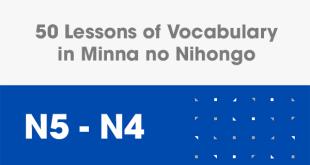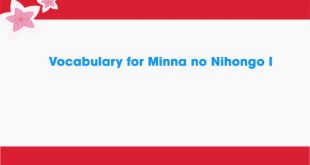Minna No Nihongo Lesson 23 Grammar
1. + とき
Structure: Dictionary verb verb / verb form ない / noun の / noun の / adjective い / adjective な / noun の + とき
Meaning: When ~
How to use :
Match the 2 clauses of the sentence.
Indicates the time at which the state, movement, or phenomenon is expressed in the following clause
The time of adjectives and noun modifiers does not depend on the time of the main sentence
For example :
しんぶんをよむとき、めがねをかけます。
I wear glasses when reading newspapers
でかけるとき、いってまいりますといいます。
When I go out, say “I’m going”
こない時とき、わたしにれんらくしてください。
When you are not coming, contact me
ひま)なとき、えいがをみます。
When I have free time, I watch movies
27さいのとき、けっこんしました。
When I was 27 years old, I was married
2. The dictionary verb / the verb た + とき
Meaning: When
How to use :
Dictionary-verb + とき: the action has not ended
Verb た + とき: the action has ended
For example :
とうきょうへいくとき、このかばんを かいました。
I bought this briefcase when I went to Tokyo。(This briefcase was purchased on the way to Tokyo)
とうきょうへいったとき、このかばんをかいました。
I bought this briefcase when I went to Tokyo (This briefcase was bought after coming to Tokyo)
でかけるとき、でんきをけしてください。
When leaving the house, turn off the electricity
でた時とき、ドアをしめてください。
When leaving the house, close the door
3. The dictionary form verb / the verb form ない + と,~
Meaning: ~ then / is ~
How to use :
[と] is used to concatenate 2 clauses of a sentence
Describe an inevitable result of an action.
Do not use it to signify an intention, a hope, an invitation or a request.
For example:
このボタンを おすと、おつりが でます。
If you press this button, then excess cash will run
これを まわすと、おとが おおきく なります。
If you turn this on, the sound will get louder
みぎへ まがると、ゆうびんきょくが あります。
If you turn right, there will be a post office.
にほんごが わからないと、こまりますよ。
If you do not know Japanese, it will be difficult.
もっとがんばらないごうかくできません。
If you don’t try harder, then won’t be able to pass
4. The noun が adjective / verbs
Usage: Used to describe a natural phenomenon, state, or situation
For example:
おとが ちいさいです。
Small sound
てんきが あかるくなりました。
The weather became clear
5. Noun (great point) + を + verb
Usage: Used to indicate the location, location where a person or an object passes by
For example :
こうえんをさんぽします。
Walking in the park
みちをわたります。
Cross the road
こうさてんをみぎへまがります。
go right in the crossroads.
Related Post: Minna No Nihongo Lesson 23 Vocabulary
 Learn Japanese Free Learn Japanese Free
Learn Japanese Free Learn Japanese Free







